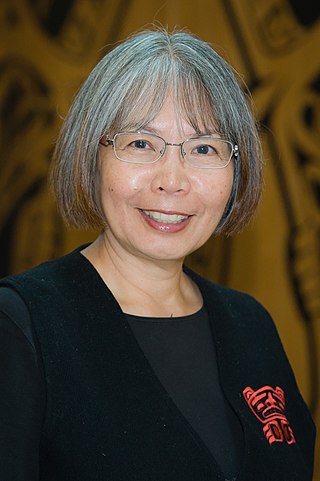
Thomas King is an American-born Canadian writer and broadcast presenter who most often writes about First Nations.

Daniel Trefler is a Canadian economist who is currently the J. Douglas and Ruth Grant Chair in Competitiveness and Prosperity at the Rotman School of Management, University of Toronto. He is among the most influential and frequently cited economists worldwide.
Warren Cariou is a Canadian writer and associate professor of English at the University of Manitoba.
Kateri Akiwenzie-Damm is an Anishinaabe writer of mixed ancestry from the Chippewas of Nawash First Nation in Canada. She lives and works at Neyaashiinigmiing, Cape Croker Reserve on the Saugeen Peninsula in southwestern Ontario, and in Ottawa, Ontario.
Joseph A. Dandurand is a Kwantlen person (Xalatsep) from Kwantlen First Nation in British Columbia. He is a poet, playwright, and archaeologist.
Barry Morton Gough is a global maritime and naval historian.

Sandra Djwa is a Canadian writer, critic and cultural biographer. Originally from Newfoundland, she moved to British Columbia where she obtained her PhD from the University of British Columbia in 1968. In 1999, she was honored to deliver the Garnett Sedgewick Memorial Lecture in honor of the department's 80th anniversary. She taught Canadian literature in the English department at Simon Fraser University from 1968 to 2005 when she retired as J.S. Woodsworth Resident Scholar, Humanities. She was part of a seventies movement to establish the study of Canadian literature and, in 1973, cofounded the Association for Canadian and Québec Literatures (ACQL). She was Chair of the inaugural meeting of ACQL. She initiated textual studies of the poems of E. J. Pratt in the eighties, was editor of Poetry, "Letters in Canada" for the University of Toronto Quarterly (1980-4), and Chair of Canadian Heads and Chairs of English (1989).
Leo Yerxa is a Canadian visual artist, medallist, and writer. As an illustrator of children's picture books he won the Governor General's Award in 2006. He lived in Ottawa, Ontario, then. He died on September 1, 2017.
Native American literature is literature, both oral and written, produced by Native Americans in what is now the United States, from pre-Columbian times through to today. Famous authors include N. Scott Momaday, Leslie Marmon Silko, Simon Ortiz, Louise Erdrich, Gerald Vizenor, Joy Harjo, Sherman Alexie, D'Arcy McNickle, James Welch, Charles Eastman, Mourning Dove, Zitkala-Sa, John Rollin Ridge, Lynn Riggs, Hanay Geiogamah, William Apess, Samson Occom, and Stephen Graham Jones. Importantly, it is not "a" literature, but a set of literatures, since every tribe has its own cultural traditions. Since the 1960s, it has also become a significant field of literary studies, with academic journals, departments, and conferences devoted to the subject.

Keren D. Rice is a Canadian linguist. She is a professor of linguistics and serves as the Director of the Centre for Aboriginal Initiatives at the University of Toronto.
Indigenous peoples of Canada are culturally diverse. Each group has its own literature, language and culture. The term "Indigenous literature" therefore can be misleading. As writer Jeannette Armstrong states in one interview, "I would stay away from the idea of "Native" literature, there is no such thing. There is Mohawk literature, there is Okanagan literature, but there is no generic Native in Canada".

Cherie Dimaline is writer and a member of the Georgian Bay Métis Council of the Métis Nation of Ontario. She has written a variety of award-winning novels and other acclaimed stories and articles. She is most noted for her 2017 young adult novel The Marrow Thieves, which explores the continued colonial exploitation of Indigenous people.
Bonita Lawrence is a Canadian writer, scholar, and professor in the Department of Equity Studies at York University in Toronto, Canada. Her work focuses on issues related to Indigenous identity and governance, equity, and racism in Canada. She is also a traditional singer at political rallies, social events, and prisons in the Toronto and Kingston areas.
Billy-Ray Belcourt is a poet, scholar, and author from the Driftpile Cree Nation.

Jo-Ann Archibald, also known as Q’um Q’um Xiiem, is an Indigenous studies scholar from the Sto:lo First Nation in British Columbia, Canada.
Gwen Benaway is a Canadian poet and activist. As of October 2019, she was a PhD candidate in the Women & Gender Studies Institute at the Faculty of Arts & Science at the University of Toronto. Benaway has also written non-fiction for The Globe and Mail and Maclean's.

Sharron Proulx-Turner was a two-spirit Métis writer. She investigated themes of Métis storytelling and was recognized as a mentor to other writers.
Margery Fee is a professor emeritus of English at the University of British Columbia (UBC). From 2015 to 2017, Fee was the Brenda and David McLean Chair In Canadian Studies at UBC. She publishes in the fields of Canadian, postcolonial and Indigenous studies and Canadian English usage and lexicography.
Sarah Alexandra Carter is a Canadian historian. She is Professor and the Henry Marshall Tory Chair at the University of Alberta in both the Department of History and Classics and the Faculty of Native Studies with noted specialties in Indigenous and women's history.
Ran Hirschl is a political scientist and comparative legal scholar. He is the David R. Cameron Distinguished Professor of Law and Politics at the University of Toronto. Previously, he held the Canada Research Chair in Constitutionalism, Democracy and Development at the University of Toronto. He is the author of several major books and over one hundred and fifty articles on constitutional law and its intersection with comparative politics and society. In 2014, he was elected a Fellow of the Royal Society of Canada. In 2021, he was awarded the Stein Rokkan Prize for Comparative Social Science Research for his book City, State: Constitutionalism and the Megacity.







